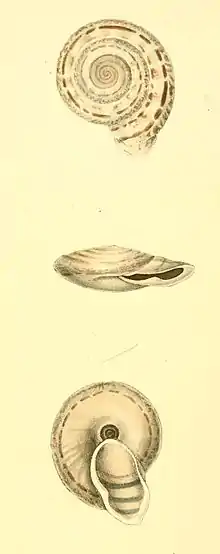
HELIX auriculata.
Eared Helix.
Generic Character.
- Testa orbicularis vel globosa. Spira depressa vel paululum elevata. Apertura integra. Labium exterius marginatum. Operculum nullum.
- Shell orbicular or globose. Spire depressed, or but slightly elevated. Aperture entire. Outer lip margined. Operculum, none.
Specific Character.
- H. testâ depressissimâ, ferrugineo-marmoratâ et bifasciatâ, umbilico magno, profundo, aperturâ auriformi; labio exteriore incrassato, margine interiore dente obsoleto.
- Shell much depressed, marbled and doubly-banded with ferrugineous. Umbilicus large, deep. Aperture ear-shaped. Outer lip thickened, reflected, with a gibbous obsolete tooth within.
A shell no less remarkable for its form than its extreme rarity. The mouth bears a most striking resemblance to the human ear; and the only specimen known in this country is the one here figured, from the cabinet of Ch. Dubois, Esq., who obligingly favoured me with it for examination; neither does the exquisite work on the Land Shells, by M. de Ferrusac, now publishing at Paris, contain this species among the numerous matchless figures already given of this family.
In the present uncertainty respecting the natural groups of the genus Helix, as left by Lamarck, I have preferred for the present following the example of Cuvier and de Ferrusac, in placing it with that family, in preference to adopting the ill-defined and palpably artificial distribution of them by D. de Montfort, or of forming a new genus for its reception.
The variegations in its colouring are better seen in the figures than described. The whole shell is slightly marked with obsolete longitudinal striæ; the umbilicus is very deep, and the tooth does not extend externally beyond the margin of the lip.